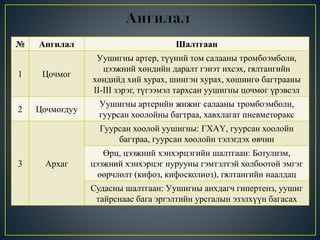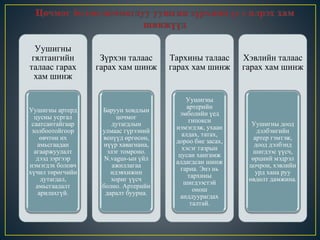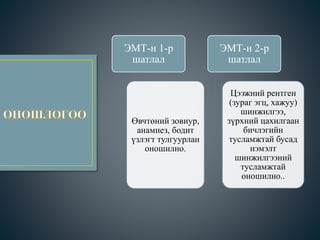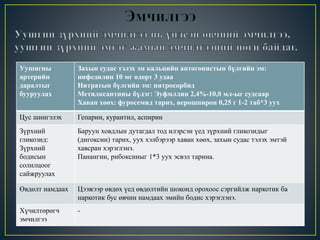More Related Content What's hot (20)
Arhag gastrit Arhag gastrit
ąæą░čéčģę»ę» ąæą░čéą┤ąŠčĆąČ ╠²
ąÉčĆčģą░ą│ ą│ą░čüčéčĆąĖčé 菹╝čćąĖą╗ą│čŹčŹ
Chronic Gastritis Treatment
PPT čģčŹčĆ菹│čé菹╣ ą▒ąŠą╗ btk1092@gmail.com čģą░čÅą│ą░ą░čĆ čģąŠą╗ą▒ąŠą│ą┤ąŠąĮąŠ čāčā
Viewers also liked (20)
7 cor pulmonale 7 cor pulmonale
internalmed ╠²
Cor Pulmonale, also known as pulmonary heart disease, is caused by high blood pressure in the lungs secondary to diseases affecting the lungs, chest wall, or pulmonary vasculature. It is characterized by hypertrophy and dilation of the right ventricle of the heart in response to the elevated pulmonary pressures. The main symptoms include cough, sputum production, shortness of breath, fatigue, and leg swelling. Diagnosis involves assessing the patient's medical history along with tests such as chest x-rays, electrocardiograms, echocardiograms, and blood gas analysis. Treatment focuses on controlling infections, improving oxygen levels, managing heart failure, and preventing complications through patient monitoring and education.
Similar to Cor et pulmonalis (20) 2. ŌĆó ąŻčāčłąĖą│, ą│čāčāčĆčüą░ąĮ čģąŠąŠą╗ąŠą╣, čāčāčłąĖą│ąĮčŗ
čüčāą┤ą░čü, čåčŹčŹąČąĮąĖą╣ čģ菹ĮčģčŹčĆčåą│ąĖą╣ąĮ 菹╝ą│菹│
ė®ė®čĆčćą╗ė®ą╗čéąĖą╣ąĮ čāą╗ą╝ą░ą░čü čåčāčüąĮčŗ ą▒ą░ą│ą░
čŹčĆą│菹╗čéąĖą╣ąĮ ą┤ą░čĆą░ą╗čé ąĖčģčŹčüčć, ąĘę»čĆčģąĮąĖą╣
ą▒ą░čĆčāčāąĮ čģąŠą▓ą┤ąŠą╗ č鹊ą╝čĆąŠčģ, (čŹčüą▓菹╗)
čé菹╗čŹčģ čģą░ą╝ čłąĖąĮąČąĖą╣ą│ ąŻąŻą©ąōąśąØ
ąŚę«ąĀąź ą│菹ĮčŹ.
3. Ōä¢ ąÉąĮą│ąĖą╗ą░ą╗ ą©ą░ą╗čéą│ą░ą░ąĮ
1 ą”ąŠčćą╝ąŠą│
ąŻčāčłąĖą│ąĮčŗ ą░čĆč鹥čĆ, čéę»ę»ąĮąĖą╣ č鹊ą╝ čüą░ą╗ą░ą░ąĮčŗ čéčĆąŠą╝ą▒ąŠčŹą╝ą▒ąŠą╗ąĖ,
čåčŹčŹąČąĮąĖą╣ čģė®ąĮą┤ąĖą╣ąĮ ą┤ą░čĆą░ą╗čé ą│菹ĮčŹčé ąĖčģčüčŹčģ, ą│čÅą╗čéą░ąĮą│ąĖą╣ąĮ
čģė®ąĮą┤ąĖą╣ą┤ čģąĖą╣ čģčāčĆą░čģ, čłąĖąĮą│菹Į čģčāčĆą░čģ, čģė®čłąĖąĮą│ė® ą▒ą░ą│čéčĆą░ą░ąĮčŗ
II-III ąĘčŹčĆ菹│, čé껹│čŹčŹą╝菹╗ čéą░čĆčģčüą░ąĮ čāčāčłąĖą│ąĮčŗ čåąŠčćą╝ąŠą│ ę»čĆ菹▓čü菹╗
2 ą”ąŠčćą╝ąŠą│ą┤čāčā
ąŻčāčłąĖą│ąĮčŗ ą░čĆč鹥čĆąĖą╣ąĮ ąČąĖąČąĖą│ čüą░ą╗ą░ą░ąĮčŗ čéčĆąŠą╝ą▒ąŠčŹą╝ą▒ąŠą╗ąĖ,
ą│čāčāčĆčüą░ąĮ čģąŠąŠą╗ąŠą╣ąĮčŗ ą▒ą░ą│čéčĆą░ą░, čģą░ą▓čģą╗ą░ą│ą░čé ą┐ąĮąĄą▓ą╝ąĄč鹊čĆą░ą║čü
3 ąÉčĆčģą░ą│
ąōčāčāčĆčüą░ąĮ čģąŠąŠą╗ąŠą╣ čāčāčłąĖą│ąĮčŗ: ąōąźąÉę«, ą│čāčāčĆčüą░ąĮ čģąŠąŠą╗ąŠą╣ąĮ
ą▒ą░ą│čéčĆą░ą░, ą│čāčāčĆčüą░ąĮ čģąŠąŠą╗ąŠą╣ąĮ čé菹╗菹│ą┤čŹčģ ė®ą▓čćąĖąĮ
ė©čĆčå, čåčŹčŹąČąĮąĖą╣ čģ菹ĮčģčŹčĆčå菹│ąĖą╣ąĮ čłą░ą╗čéą│ą░ą░ąĮ: ąæąŠčéčāą╗ąĖąĘą╝,
čåčŹčŹąČąĮąĖą╣ čģ菹ĮčģčŹčĆčå菹│ ąĮčāčĆčāčāąĮčŗ ą│菹╝čé菹╗čé菹╣ čģąŠą╗ą▒ąŠąŠč鹊ą╣ 菹╝ą│菹│
ė®ė®čĆčćą╗ė®ą╗čé (ą║ąĖč乊ąĘ, ą║ąĖč乊čüą║ąŠą╗ąĖąŠąĘ), ą│čÅą╗čéą░ąĮą│ąĖą╣ąĮ ąĮą░ą░ą╗ą┤ą░čå
ąĪčāą┤ą░čüąĮčŗ čłą░ą╗čéą│ą░ą░ąĮ: ąŻčāčłąĖą│ąĮčŗ ą░ąĮčģą┤ą░ą│čć ą│ąĖą┐ąĄčĆč鹥ąĮąĘ, čāčāčłąĖą│
čéą░ą╣čĆčüąĮą░ą░čü ą▒ą░ą│ą░ čŹčĆą│菹╗čéąĖą╣ąĮ čāčĆčüą│ą░ą╗čŗąĮ 菹Ę菹╗čģę»ę»ąĮ ą▒ą░ą│ą░čüą░čģ
4. ŌĆó ąŻčāčłąĖą│ąĮčŗ ą░čĆč鹥čĆąĖą╣ąĮ ą┤菹╗ą▒菹Įą│ąĖą╣ąĮ
ą▒ąŠą╗ąŠąĮ čüąĄą│ą╝ąĄąĮčéąĖą╣ąĮ čüą░ą╗ą░ą░ąĮčāčāą┤
ą▒ė®ą│ą╗ė®čĆė®čģ 껹Ąą┤ čåąŠčćą╝ąŠą│, čåąŠčćą╝ąŠą│ą┤čāčā
čāčāčłą│ąĖąĮ ąĘę»čĆčģ ę»ę»čüąĮčŹ.
ŌĆó ą©ąĖąĮąČ čé菹╝ą┤ą│ę»ę»ą┤ ąĮčī čģčāčĆą┤ą░ąĮ
čģčāą│ą░čåą░ą░ąĮą┤ ą┤ą░ą░ą╝ąČčĆą░čģ ą▒ė®ą│ė®ė®ą┤ 菹╝ąĮ菹╗
ąĘ껹╣ą┤ 껹Įą┤čü菹Į 4 čģą░ą╝ čłąĖąĮąČčŹčŹčĆ ąĖą╗čŹčĆąĮčŹ.
5. ąŻčāčłąĖą│ąĮčŗ
ą│čÅą╗čéą░ąĮą│ąĖą╣ąĮ
čéą░ą╗ą░ą░čü ą│ą░čĆą░čģ
čģą░ą╝ čłąĖąĮąČ
ąŻčāčłąĖą│ąĮčŗ ą░čĆč鹥čĆą┤
čåčāčüąĮčŗ čāčüčĆą│ą░ą╗
čüą░ą░čéčüą░ąĮčéą░ą╣ą│ą░ą░čĆ
čģąŠą╗ą▒ąŠąŠč鹊ą╣ą│ąŠąŠčĆ
ė®ą▓čćčéė®ąĮ ąĖčģ
ą░ą╝čīčüą│ą░ą░ą┤ą░ąĮ
ą░ą│ą░ą░čĆąČčāčāą╗ą░ą╗čé
ą┤čŹčŹą┤ ąĘčŹčĆą│čŹčŹčĆ
ąĮ菹╝菹│ą┤čŹčģ ą▒ąŠą╗ąŠą▓čć
čģę»čćąĖą╗ čéė®čĆė®ą│čćąĖą╣ąĮ
ą┤čāčéą░ą│ą┤ą░ą╗,
ą░ą╝čīčüą│ą░ą░ą┤ą░ą╗čé
ą░čĆąĖą╗ą░čģą│껹╣.
ąŚę»čĆčģ菹Į čéą░ą╗ą░ą░čü
ą│ą░čĆą░čģ čģą░ą╝ čłąĖąĮąČ
ąæą░čĆčāčāąĮ čģąŠą▓ą┤ą╗čŗąĮ
čåąŠčćą╝ąŠą│
ą┤čāčéą░ą│ą┤ą╗čŗąĮ
čāą╗ą╝ą░ą░čü ą│ę»čĆčŹčŹąĮąĖą╣
ą▓ąĄąĮę»ę»ą┤ ė®čĆą│ė®čüė®ąĮ,
ąĮę»ę»čĆ čģą░ą▓ą░ą│ąĮą░ąĮą░,
菹╗菹│ č鹊ą╝čĆąŠąĮąŠ.
N.vagus-čŗąĮ 껹╣ą╗
ą░ąČąĖą╗ą╗ą░ą│ą░ą░
ąĖą┤菹▓čģąĖąČąĖąĮ
čģąŠčĆąĖą│ ę»ę»čüčć
ą▒ąŠą╗ąĮąŠ. ąÉčĆč鹥čĆąĖą╣ąĮ
ą┤ą░čĆą░ą╗čé ą▒čāčāčĆąĮą░.
ąóą░čĆčģąĖąĮčŗ čéą░ą╗ą░ą░čü
ą│ą░čĆą░čģ čģą░ą╝ čłąĖąĮąČ
ąŻčāčłąĖą│ąĮčŗ
ą░čĆč鹥čĆąĖą╣ąĮ
菹╝ą▒ąŠą╗ąĖą╣ąĮ 껹Ąą┤
ą│ąĖą┐ąŠą║čüąĖ
ąĮ菹╝菹│ą┤菹Č, čāčģą░ą░ąĮ
ą░ą╗ą┤ą░čģ, čéą░čéą░čģ,
ą┤ąŠčĆąŠąŠ ą▒ąĖąĄ ąĘą░čüą░čģ,
čģčŹčü菹│ ą│ą░ąĘčĆčŗąĮ
čåčāčüą░ąĮ čģą░ąĮą│ą░ą╝ąČ
ą░ą╗ą┤ą░ą│ą┤čüą░ąĮ čłąĖąĮąČ
ą│ą░čĆąĮą░. ąŁąĮčŹ ąĮčī
čéą░čĆčģąĖąĮčŗ
čłąĖą│ą┤čŹčŹčüčé菹╣
ąŠąĮąŠčł
ą░ąĮą┤ą┤čāčāčĆą░ą│ą┤ą░čģ
čéą░ą╗čéą░ą╣.
ąźčŹą▓ą╗ąĖą╣ąĮ čéą░ą╗ą░ą░čü
ą│ą░čĆą░čģ čģą░ą╝ čłąĖąĮąČ
ąŻčāčłąĖą│ąĮčŗ ą┤ąŠąŠą┤
ą┤菹╗ą▒菹Įą│ąĖą╣ąĮ
ą░čĆč鹥čĆ ą│菹╝čé菹Č,
ą┤ąŠąŠą┤ ą┤菹╗ą▒菹Įą┤
čłąĖą│ą┤čŹčŹčü ę»ę»čüčć,
ė®čĆčåąĮąĖą╣ ą╝菹┤čĆ菹╗
čåąŠčćčĆąŠąĮ, čģ菹▓ą╗ąĖą╣ąĮ
čāčĆą┤ čģą░ąĮą░ čĆčāčā
ė®ą▓ą┤ė®ą╗čé ą┤ą░ą╝ąČąĖąĮą░.
6. ŌĆó ąŁąĮčŹ ąĮčī 껹Įą┤čü菹Į ė®ą▓čćąĮąĖą╣ 菹╝ąĮ菹╗ ąĘ껹╣
ą░ą╝čīčüą│ą░ą╗čŗąĮ ą┤čāčéą░ą│ą┤ą░ą╗, čåčāčüąĮčŗ ą▒ą░ą│ą░
čŹčĆą│菹╗čéąĖą╣ąĮ ą│ąĖą┐ąĄčĆč鹥ąĮąĘąĖą╣ąĮ, ą▒ą░čĆčāčāąĮ
čģąŠą▓ą┤ą╗čŗąĮ č鹊ą╝čĆąŠą╗čŗąĮ čłąĖąĮąČ,
ą▒ą░čĆčāčāąĮ čģąŠą▓ą┤ą╗čŗąĮ ą┤čāčéą░ą│ą┤ą╗čŗąĮ
čłąĖąĮąČ ąĖą╗čŹčĆąĮčŹ.
7. ąŁą£ąó-ąĮ 1-čĆ
čłą░čéą╗ą░ą╗
ė©ą▓čćčéė®ąĮąĖą╣ ąĘąŠą▓ąĖčāčĆ,
ą░ąĮą░ą╝ąĮąĄąĘ, ą▒ąŠą┤ąĖčé
껹ʹ╗菹│čé čéčāą╗ą│čāčāčĆą╗ą░ąĮ
ąŠąĮąŠčłąĖą╗ąĮąŠ.
ąŁą£ąó-ąĮ 2-čĆ
čłą░čéą╗ą░ą╗
ą”čŹčŹąČąĮąĖą╣ čĆąĄąĮčéą│ąĄąĮ
(ąĘčāčĆą░ą│ 菹│čå, čģą░ąČčāčā)
čłąĖąĮąČąĖą╗ą│čŹčŹ,
ąĘę»čĆčģąĮąĖą╣ čåą░čģąĖą╗ą│ą░ą░ąĮ
ą▒ąĖčćą╗菹│ąĖą╣ąĮ
čéčāčüą╗ą░ą╝ąČčéą░ą╣ ą▒čāčüą░ą┤
ąĮ菹╝菹╗čé
čłąĖąĮąČąĖą╗ą│čŹčŹąĮąĖą╣
čéčāčüą╗ą░ą╝ąČčéą░ą╣
ąŠąĮąŠčłąĖą╗ąĮąŠ..
8. ąŻčāčłąĖą│ąĮčŗ
ą░čĆč鹥čĆąĖą╣ąĮ
ą┤ą░čĆą░ą╗čéčŗą│
ą▒čāčāčĆčāčāą╗ą░čģ
ąŚą░čģčŗąĮ čüčāą┤ą░čü čé菹╗čŹčģ 菹╝ ą║ą░ą╗čīčåąĖą╣ąĮ ą░ąĮč鹊ą│ąŠąĮąĖčüčéčŗąĮ ą▒껹╗ą│ąĖą╣ąĮ 菹╝:
ąĮąĖč乥ą┤ąĖą╗ąĖąĮ 10 ą╝ą│ ė®ą┤ė®čĆčé 3 čāą┤ą░ą░
ąØąĖčéčĆą░čéčŗąĮ ą▒껹╗ą│ąĖą╣ąĮ 菹╝: ąĮąĖčéčĆąŠčüąŠčĆą▒ąĖą┤
ą£ąĄčéąĖą╗ą║čüą░ąĮčéąĖąĮčŗ ą▒껹╗菹│: ąŁčāčäą╝ą╗ą╗ąĖąĮ 2,4%-10,0 ą╝ą╗-čŗą│ čüčāą┤čüą░ą░čĆ
ąźą░ą▓ą░ąĮ čģė®ė®čģ: čäčāčĆąŠčüąĄą╝ąĖą┤ čéą░čĆąĖčģ, ą▓ąĄčĆąŠčłą┐ąĖčĆąŠąĮ 0,25 ą│ 1-2 čéą░ą▒*3 čāčāčģ
ą”čāčü čłąĖąĮą│菹╗čŹčģ ąōąĄą┐ą░čĆąĖąĮ, ą║čāčĆą░ąĮčéąĖą╗, ą░čüą┐ąĖčĆąĖąĮ
ąŚę»čĆčģąĮąĖą╣
ą│ą╗ąĖą║ąŠąĘąĖą┤:
ąŚę»čĆčģąĮąĖą╣
ą▒ąŠą┤ąĖčüčŗąĮ
čüąŠą╗ąĖą╗čåąŠąŠą│
čüą░ą╣ąČčĆčāčāą╗ą░čģ
ąæą░čĆčāčāąĮ čģąŠą▓ą┤ą╗čŗąĮ ą┤čāčéą░ą│ą┤ą░ą╗ č鹊ą┤ ąĖą╗čŹčĆčü菹Į 껹Ąą┤ ąĘę»čĆčģąĮąĖą╣ ą│ą╗ąĖą║ąŠąĘąĖą┤čŗą│
(ą┤ąĖą│ąŠą║čüąĖąĮ) čéą░čĆąĖčģ, čāčāčģ čģ菹╗ą▒čŹčĆčŹčŹčĆ čģą░ą▓ą░ąĮ čģė®ė®čģ, ąĘą░čģčŗąĮ čüčāą┤ą░čü čé菹╗čŹčģ 菹╝čé菹╣
čģą░ą▓čüčĆą░ąĮ čģčŹčĆ菹│ą╗菹ĮčŹ.
ą¤ą░ąĮą░ąĮą│ąĖąĮ, čĆąĖą▒ąŠą║čüąĖąĮčŗą│ 1*3 čāčāčģ čŹčüą▓菹╗ čéą░čĆąĖąĮą░.
ė©ą▓ą┤ė®ą╗čé ąĮą░ą╝ą┤ą░ą░čģ ą”čŹčŹąČčŹčŹčĆ ė®ą▓ą┤ė®čģ 껹Ąą┤ ė®ą▓ą┤ė®ą╗čéąĖą╣ąĮ čłąŠą║ąŠąĮą┤ ąŠčĆąŠčģąŠąŠčü čüčŹčĆą│ąĖą╣ą╗ąČ ąĮą░čĆą║ąŠčéąĖą║ ą▒ą░
ąĮą░čĆą║ąŠčéąĖą║ ą▒čāčü ė®ą▓čćąĖąĮ ąĮą░ą╝ą┤ą░ą░čģ 菹╝ąĖą╣ąĮ ą▒ąŠą┤ąĖčü čģčŹčĆ菹│ą╗菹ĮčŹ.
ąźę»čćąĖą╗čéė®čĆė®ą│čć
菹╝čćąĖą╗ą│čŹčŹ
-








